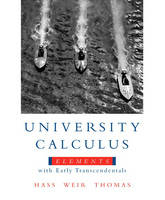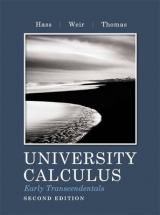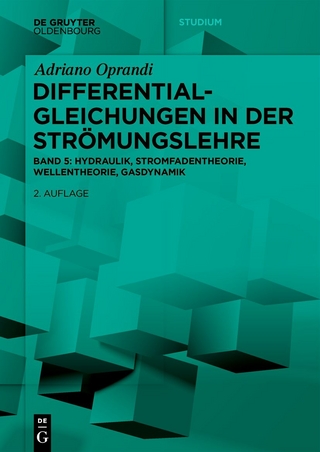
University Calculus
Pearson (Verlag)
978-0-321-53348-7 (ISBN)
- Titel erscheint in neuer Auflage
- Artikel merken
Joel Hass received his PhD from the University of California—Berkeley. He is currently a professor of mathematics at the University of California—Davis. He has coauthored six widely used calculus texts as well as two calculus study guides. He is currently on the editorial board of Geometriae Dedicata and Media-Enhanced Mathematics. He has been a member of the Institute for Advanced Study at Princeton University and of the Mathematical Sciences Research Institute, and he was a Sloan Research Fellow. Hass’s current areas of research include the geometry of proteins, three dimensional manifolds, applied math, and computational complexity. In his free time, Hass enjoys kayaking. Maurice D. Weir holds a DA and MS from Carnegie-Mellon University and received his BS at Whitman College. He is a Professor Emeritus of the Department of Applied Mathematics at the Naval Postgraduate School in Monterey, California. Weir enjoys teaching Mathematical Modeling and Differential Equations. His current areas of research include modeling and simulation as well as mathematics education. Weir has been awarded the Outstanding Civilian Service Medal, the Superior Civilian Service Award, and the Schieffelin Award for Excellence in Teaching. He has coauthored eight books, including the University Calculus series and the twelfth edition of Thomas’ Calculus. George B. Thomas, Jr. (late) of the Massachusetts Institute of Technology, was a professor of mathematics for thirty-eight years; he served as the executive officer of the department for ten years and as graduate registration officer for five years. Thomas held a spot on the board of governors of the Mathematical Association of America and on the executive committee of the mathematics division of the American Society for Engineering Education. His book, Calculus and Analytic Geometry, was first published in 1951 and has since gone through multiple revisions. The text is now in its twelfth edition and continues to guide students through their calculus courses. He also co-authored monographs on mathematics, including the text Probability and Statistics.
1. Functions and Limits
1.1 Functions and Their Graphs
1.2 Combining Functions; Shifting and Scaling Graphs
1.3 Rates of Change and Tangents to Curves
1.4 Limit of a Function and Limit Laws
1.5 Precise Definition of a Limit
1.6 One-Sided Limits
1.7 Continuity
1.8 Limits Involving Infinity
Questions to Guide Your Review
Practice and Additional Exercises
2. Differentiation
2.1 Tangents and Derivatives at a Point
2.2 The Derivative as a Function
2.3 Differentiation Rules
2.4 The Derivative as a Rate of Change
2.5 Derivatives of Trigonometric Functions
2.6 Exponential Functions
2.7 The Chain Rule
2.8 Implicit Differentiation
2.9 Inverse Functions and Their Derivatives
2.10 Logarithmic Functions
2.11 Inverse Trigonometric Functions
2.12 Related Rates
2.13 Linearization and Differentials
Questions to Guide Your Review
Practice and Additional Exercises
3. Applications of Derivatives
3.1 Extreme Values of Functions
3.2 The Mean Value Theorem
3.3 Monotonic Functions and the First Derivative Test
3.4 Concavity and Curve Sketching
3.5 Parametrizations of Plane Curves
3.6 Applied Optimization
3.7 Indeterminate Forms and L'Hopital's Rule
3.8 Newton's Method
3.9 Hyperbolic Functions
Questions to Guide Your Review
Practice and Additional Exercises
4. Integration
4.1 Antiderivatives
4.2 Estimating with Finite Sums
4.3 Sigma Notation and Limits of Finite Sums
4.4 The Definite Integral
4.5 The Fundamental Theorem of Calculus
4.6 Indefinite Integrals and the Substitution Rule
4.7 Substitution and Area Between Curves
Questions to Guide Your Review
Practice and Additional Exercises
5. Techniques of Integration
5.1 Integration by Parts
5.2 Trigonometric Integrals
5.3 Trigonometric Substitutions
5.4 Integration of Rational Functions by Partial Fractions
5.5 Integral Tables and Computer Algebra Systems
5.6 Numerical Integration
5.7 Improper Integrals
Questions to Guide Your Review
Practice and Additional Exercises
6. Applications of Definite Integrals
6.1 Volumes by Slicing and Rotation About an Axis
6.2 Volumes by Cylindrical Shells
6.3 Lengths of Plane Curves
6.4 Exponential Change and Separable Differential Equations
6.5 Work and Fluid Forces
6.6 Moments and Centers of Mass
Questions to Guide Your Review
Practice and Additional Exercises
7. Infinite Sequences and Series
7.1 Sequences
7.2 Infinite Series
7.3 The Integral Test
7.4 Comparison Tests
7.5 The Ratio and Root Tests
7.6 Alternating Series, Absolute and Conditional Convergence
7.7 Power Series
7.8 Taylor and Maclaurin Series
7.9 Convergence of Taylor Series
7.10 The Binomial Series
Questions to Guide Your Review
Practice and Additional Exercises
8. Polar Coordinates and Conics
8.1 Polar Coordinates
8.2 Graphing in Polar Coordinates
8.3 Areas and Lengths in Polar Coordinates
8.4 Conics in Polar Coordinates
8.5 Conics and Parametric Equations; The Cycloid
Questions to Guide Your Review
Practice and Additional Exercises
9. Vectors and the Geometry of Space
9.1 Three-Dimensional Coordinate Systems
9.2 Vectors
9.3 The Dot Product
9.4 The Cross Product
9.5 Lines and Planes in Space
9.6 Cylinders and Quadric Surfaces
Questions to Guide Your Review
Practice and Additional Exercises
10. Vector-Valued Functions and Motion in Space
10.1 Vector Functions and Their Derivatives
10.2 Integrals of Vector Functions
10.3 Arc Length and the Unit Tangent Vector T
10.4 Curvature and the Unit Normal Vector N
10.5 Torsion and the Unit Binormal Vector B
10.6 Planetary Motion
Questions to Guide Your Review
Practice and Additional Exercises
11. Partial Derivatives
11.1 Functions of Several Variables
11.2 Limits and Continuity in Higher Dimensions
11.3 Partial Derivatives
11.4 The Chain Rule
11.5 Directional Derivatives and Gradient Vectors
11.6 Tangent Planes and Differentials
11.7 Extreme Values and Saddle Points
11.8 Lagrange Multipliers
Questions to Guide Your Review
Practice and Additional Exercises
12. Multiple Integrals
12.1 Double and Iterated Integrals over Rectangles
12.2 Double Integrals over General Regions
12.3 Area by Double Integration
12.4 Double Integrals in Polar Form
12.5 Triple Integrals in Rectangular Coordinates
12.6 Moments and Centers of Mass
12.7 Triple Integrals in Cylindrical and Spherical Coordinates
12.8 Substitutions in Multiple Integrals
Questions to Guide Your Review
Practice and Additional Exercises
13. Integration in Vector Fields
13.1 Line Integrals
13.2 Vector Fields, Work, Circulation, and Flux
13.3 Path Independence, Potential Functions, and Conservative Fields
13.4 Green's Theorem in the Plane
13.5 Surface Area and Surface Integrals
13.6 Parametrized Surfaces
13.7 Stokes' Theorem
13.8 The Divergence Theorem and a Unified Theory
Questions to Guide Your Review
Practice and Additional Exercises
Appendices
1. Real Numbers and the Real Line
2. Mathematical Induction
3. Lines, Circles, and Parabolas
4. Trigonometric Functions
5. Basic Algebra and Geometry Formulas
6. Proofs of Limit Theorems and L'Hopital's Rule
7. Commonly Occurring Limits
8. Theory of the Real Numbers
9. Convergence of Power Series and Taylor's Theorem
10. The Distributive Law for Vector Cross Products
11. The Mixed Derivative Theorem and the Increment Theorem
12. Taylor's Formula for Two Variables
| Erscheint lt. Verlag | 25.3.2008 |
|---|---|
| Sprache | englisch |
| Maße | 262 x 224 mm |
| Gewicht | 1968 g |
| Themenwelt | Mathematik / Informatik ► Mathematik ► Analysis |
| ISBN-10 | 0-321-53348-8 / 0321533488 |
| ISBN-13 | 978-0-321-53348-7 / 9780321533487 |
| Zustand | Neuware |
| Haben Sie eine Frage zum Produkt? |
aus dem Bereich



